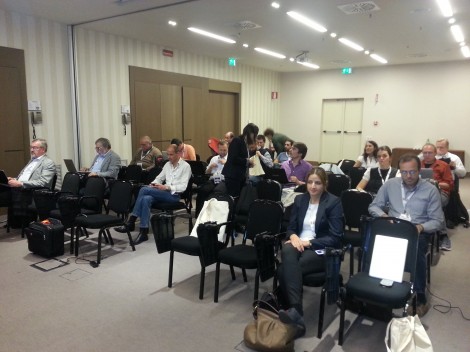 “Digital Preservation of cultural data” is the title of the workshop organised by DCH-RP in cooperation with EUDAT, SCIDIP-ES and CHAIN-REDS in the framework of the 2nd EUDAT International Conference in Rome.
“Digital Preservation of cultural data” is the title of the workshop organised by DCH-RP in cooperation with EUDAT, SCIDIP-ES and CHAIN-REDS in the framework of the 2nd EUDAT International Conference in Rome.
The workshop was a very successful event, bringing together projects and initiatives working world-wide in the domain of the digital preservation, with a specific focus on digital cultural heritage, digital arts, digital performances and digital humanities, to identify common goals and strategic approaches, find synergies, and discuss opportunities for cooperation, starting from concrete use cases.
Here below you can find all the presentations made during the event and some background information.
Programme and presentations
14:30 – 14:45 Welcome and introduction (Antonella Fresa, Promoter Srl, download PDF)
First Part: DCH and the e-infrastructures
14:45 – 15:10: Using EUDAT services to replicate, store, share, and find cultural heritage data in Poznań Supercomputing and Networking Center (Maciej Brzeźniak, Poznan Supercomputing and Networking Center – Damien Lecarpentier, CSC – IT Center for Science, download PDF)
15:10 – 15:35 Authentication and Authorisation in the Cultural Heritage community (Roberto Barbera, Istituto Nazionale di Fisica Nucleare, download PDF)
15:35 – 16:00 Scalability in preservation of cultural heritage data (Simon Lambert, Scientific Computing Department – STFC, download PDF)
16:00 – 16:30 Break
Second Part: OAIS model, standards, provenance and authenticity
16:30 – 16:50 Standard models and formats for digital preservation (Börje Justrell, Swedish National Archives, download PDF)
16:50 – 17:15 Implementation of authenticity evidence record model for supporting preservation scenarios (Luigi Briguglio, Engineering R&D Lab, download PDF)
17:15 – 17:30 Coordination of digitisation, digital access and digital preservation in Sweden (Sanja Halling, Digisam, download PDF)
Attendees
Download here the list of participants to the workshop.
Context and objectives
Medicine and Natural sciences, including astronomy, biology, chemistry, earth sciences and physics, already make use of standardized formats and e-Infrastructures services to generate, curate, share and analyse research data.
The need for novel more efficient and affordable solutions for digital preservation is now increasing also in the Social Science and Humanities, in particular the Digital Cultural Heritage (DCH) sector is producing a large volume of digital content that needs to be safely stored and curated, permanently accessed, and easily shared and re-used by researchers.
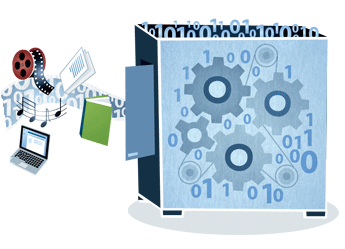
Illustration from www.digitalbevaring.dk
Each digitisation programme is currently addressing the issue of preservation in a separate manner, a shared implementation of common e-Infrastructure layers could be beneficial and cost effective.
Moreover, preservation models are often inspired by the ISO OAIS standard, where transfers and preservation are built on information packages containing both data and metadata. Even if the transferred files are in standard formats, the implementation of standards cannot be guaranteed and it is not in control neither by the institutions that produces the software for implementing them, nor by the memory institutions.
E-Infrastructures and DCH communities entered a dialogue in the last years and several data-infrastructure projects exist and look how to set up data infrastructures, including DCH use cases:
- DCH-RP: Digital Cultural Heritage Roadmap for Preservation
- SCIDIPES: SCIence Data Infrastructure for Preservation – Earth Science
- APARSEN: Alliance Permanent Access to the Record of Science in Europe network
- EUDAT: Towards a European Collaborative Data Infrastructure
- CHAIN REDS: Coordination and Harmonization of Advanced e-Infrastructures for Research and Education Data Sharing
- DARIAH: Digital Research Infrastructure for Arts and Humanities
- DASISH: Data Service Infrastructure for the Social Science and Humanities
- CLARIN: Common Language Resources and Technology Infrastructure
- SCAPE: SCAlable Preservation Environments
At the same time, new projects are about to start, such as a joint Pre-Commercial Procurement project – which is now under negotiation – whose main objective is the development of an open source software licensed reference implementation for different format standards as a tool to be used by memory institutions to check conformance with standard specifications.
Aim of the workshop is:
- To bring together projects and initiatives in the domain of the digital preservation, with a specific focus on digital cultural heritage, digital arts, digital performances and digital humanities;
- To identify common goals and strategic approaches, to find synergies, to discuss opportunities for cooperation, starting from concrete use cases;
- To progress towards establishing a Virtual Research Community for DCH acknowledged at European level and to prepare for Horizon 2020.
Target Users
- Researchers in the humanities
- Teaching and learning actors (schools, training centers, university courses)
- Cultural and creative industry for the creative use and re-use of the digital cultural content
- Content providers (e.g. cultural managers of national institutions and libraries, small institutions, private and public publishers, etc.).
- Policy makers and programme owners
- E-infrastructure providers, technology providers and R&D institutions
- R&D projects and initiatives focusing on digital preservation
Contact details
Name: Claudio Prandoni
Affiliation: Promoter Srl
Email: prandoni@promoter.it


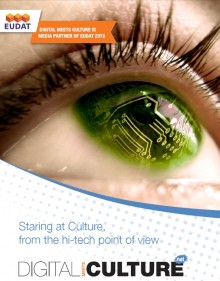
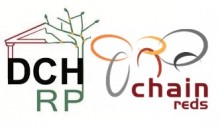
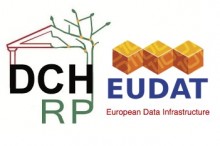
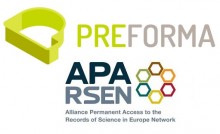
 If you have interesting news and events to point out in the field of digital cultural heritage, we are waiting for your contribution.
If you have interesting news and events to point out in the field of digital cultural heritage, we are waiting for your contribution.
























